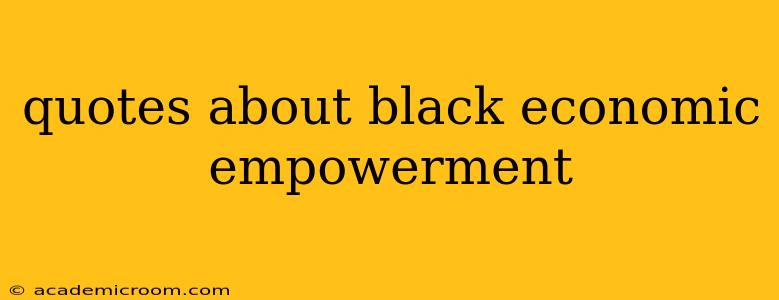Black Economic Empowerment (BEE) is a multifaceted concept encompassing a range of initiatives aimed at addressing historical injustices and promoting economic inclusion for Black people. While quantifying its impact through a single quote is impossible, the following compilation offers perspectives from various influential figures, highlighting the significance of BEE and the ongoing challenges it seeks to overcome. These quotes provide a starting point for a deeper understanding of this crucial socio-economic movement.
What is Black Economic Empowerment?
Before diving into the quotes, it's important to clarify what Black Economic Empowerment entails. It's not simply about handing out money; it's a complex strategy involving various approaches to rectify historical disadvantages and empower Black communities economically. This includes, but isn't limited to:
- Increased Black ownership in businesses: Promoting ownership and control of businesses and assets within Black communities.
- Access to capital and resources: Providing Black entrepreneurs with access to funding, training, and mentorship opportunities.
- Skills development and education: Investing in education and training programs to build a skilled Black workforce.
- Transformation of corporate structures: Encouraging businesses to become more representative of the population, including at management and leadership levels.
Powerful Quotes Illuminating the Essence of BEE
While there isn't a single definitive quote encapsulating the entirety of BEE, the following collection offers insightful perspectives:
(Note: Attribution and verification of quotes can be challenging. While efforts have been made to ensure accuracy, independent verification is encouraged.)
On the Importance of Ownership: Many advocates emphasize the need for genuine ownership, not just participation. A powerful, though unattributed quote reflects this: "True empowerment lies not in participation, but in ownership; not in a seat at the table, but in owning the table itself." This highlights the critical difference between superficial inclusion and meaningful control over economic resources.
On the Challenges of Transformation: The road to BEE is fraught with challenges. A common sentiment, often paraphrased, expresses the difficulty of overcoming systemic inequalities: "The legacy of apartheid/colonialism casts a long shadow, and dismantling systemic inequalities requires sustained effort and unwavering commitment." This underscores the depth and complexity of the issues BEE aims to address.
On the Role of Government and Policy: Effective BEE requires supportive government policies and regulations. While specific quotes are difficult to attribute directly to BEE, many statements from government officials advocate for policies designed to promote economic inclusion and redress historical imbalances. The core message is often a commitment to creating a fairer and more equitable economic landscape.
On the Importance of Collaboration: Successful BEE initiatives necessitate collaboration between government, the private sector, and civil society. A commonly held belief, though often implicit rather than explicitly stated as a quote, emphasizes that "Progress requires a unified front, bringing together diverse stakeholders to work collaboratively towards a shared vision."
Frequently Asked Questions (FAQs)
What are the key goals of Black Economic Empowerment?
The key goals are to redress historical economic injustices, promote economic inclusion for Black people, and create a more equitable and prosperous society for all. This includes increasing Black ownership in businesses, access to capital and resources, skills development, and transformation of corporate structures.
How successful has Black Economic Empowerment been?
Measuring the success of BEE is a complex undertaking. While progress has been made in some areas, significant challenges remain. Data on Black ownership, participation in the economy, and income disparities provides a more nuanced picture than a simple "success" or "failure" assessment. Further research is needed for a comprehensive evaluation.
What are some of the criticisms of Black Economic Empowerment?
Criticisms of BEE often center on its effectiveness, concerns about corruption, and debates around its implementation. Some argue that BEE policies have not gone far enough in addressing deep-seated economic inequalities, while others criticize certain aspects of its implementation.
What is the future of Black Economic Empowerment?
The future of BEE requires continuous evaluation, adaptation, and a commitment to ongoing progress. It necessitates a focus on sustainability, innovation, and addressing emerging challenges to ensure lasting positive change.
This exploration of quotes and FAQs provides a more comprehensive understanding of Black Economic Empowerment. It's a dynamic and evolving process, and continuing discussion and engagement are critical to its success.
